October 24, 2025
Updated: February 18, 2026
Compare Austria’s leading pentesting providers DeepStrike’s manual-first PTaaS vs. SEC Consult, 7Security, OSM, Hackner, and XSEC on service scope, pricing, certifications, and compliance coverage under GDPR & NIS2.
Mohammed Khalil
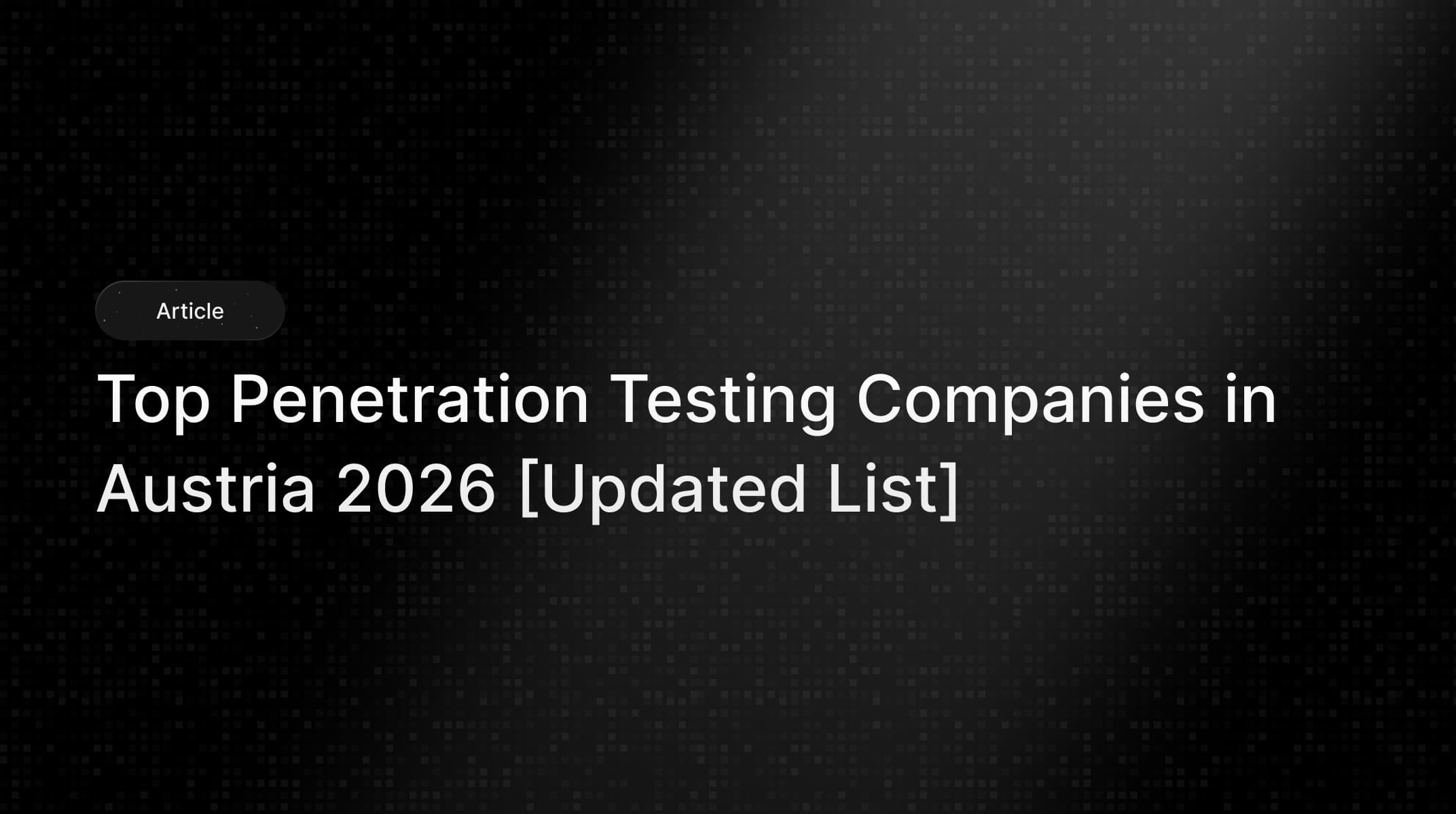
Prioritize:
Common Mistakes:
Austria’s 2026 pentesting market is defined by governance pressure, AI driven threats, compliance enforcement, and insurance requirements. Organizations are shifting from occasional technical audits to continuous, identity focused, and compliance aligned security partnerships.
Austria’s cybersecurity landscape has entered a decisive governance phase in 2026, where penetration testing is no longer treated as an IT checkbox, procurement formality, or technical afterthought, but as a board level risk management instrument tied directly to financial exposure, regulatory liability, shareholder accountability, and long term business continuity planning. Executive boards, risk committees, and legal departments increasingly treat offensive security validation as a financial safeguard rather than a technical service. The average global cost of a data breach has now crossed the $5M threshold, with European regulatory fines, operational downtime, contractual penalties, civil litigation, customer churn, and reputational erosion frequently exceeding traditional IT and security budgets combined. For Austrian enterprises operating under GDPR enforcement cycles, NIS2 supervisory authority actions, DORA financial sector mandates, sector specific EU digital resilience directives, and emerging digital sovereignty requirements, proactive security validation has shifted from optional best practice to a documented operational necessity embedded in governance frameworks, quarterly risk reviews, insurance negotiations, and annual audit cycles.
Simultaneously, artificial intelligence has accelerated both sides of the threat equation at an unprecedented pace. Adversaries now deploy automated reconnaissance engines, credential stuffing frameworks, deepfake driven social engineering campaigns, AI assisted phishing kits, polymorphic malware capable of adapting in near real time, and large scale botnets targeting APIs and identity providers. Attack campaigns increasingly leverage automation for scale and human expertise for precision, resulting in hybrid threat models that evolve faster than traditional defensive controls. Defenders are therefore compelled to adopt continuous validation models, structured red team exercises, breach and attack simulations, purple team collaboration, DevSecOps integrated testing pipelines, and identity centric threat modeling rather than relying on single annual vulnerability scans that quickly become outdated. Austria’s strong digital economy, rapidly expanding SaaS ecosystem, smart manufacturing initiatives, fintech innovation, healthcare digitization, and industrial IoT adoption have dramatically expanded the attack surface across APIs, hybrid cloud infrastructure, identity providers, CI/CD pipelines, microservices, container orchestration platforms, data lakes, and third party integrations.
Market analysts project double digit growth in European penetration testing and PTaaS spending through 2027 and into 2028, driven by cyber insurance underwriting requirements, procurement formalization, supply chain risk management obligations, ESG linked governance metrics, and cross border compliance audits. Boards increasingly request independent validation reports alongside financial statements, sustainability disclosures, and vendor risk assessments, while CISOs are expected to demonstrate measurable reduction in attack surface exposure, mean time to detect MTTD, mean time to remediate MTTR, and vulnerability recurrence rates. This ranking is based on independent research and multi factor evaluation, designed to mirror how real procurement teams, compliance officers, audit committees, and risk executives compare vendors in regulated and competitive Austrian markets rather than relying on superficial marketing claims, sponsored listings, or single metric scoring systems that fail to capture operational nuance, delivery quality, and long term partnership value.
Beyond compliance and governance, penetration testing in 2026 also serves as a strategic enabler for digital transformation, mergers and acquisitions, and product launch readiness. Organizations modernizing legacy infrastructure, migrating to multi cloud architectures, adopting zero trust models, or launching new customer facing platforms increasingly integrate offensive security validation as part of product development lifecycles and pre release quality assurance. The conversation has shifted from Should we test? to How frequently, how deeply, and with which specialization, tooling, and reporting depth? This shift is particularly visible across Austrian fintech, healthcare technology, energy, logistics, and advanced manufacturing sectors where digital trust directly influences customer retention, regulatory approval, insurance premiums, and partnership eligibility.
2026 introduced structural, technological, economic, and regulatory shifts that materially altered how Austrian organizations evaluate penetration testing providers, validation methodologies, and long term security strategies:
These developments justify why a 2026 intelligence layer is required rather than relying on legacy 2025 comparisons, as tooling, threat models, compliance expectations, procurement behaviors, economic pressures, and technological dependencies have materially evolved across both private and public sectors.
Companies were evaluated based on a multi dimensional methodology designed to reflect real world procurement decision processes rather than simplistic ranking formulas or marketing driven visibility metrics. The evaluation emphasizes delivery quality, methodological rigor, and sector alignment rather than advertising presence or brand size:
Companies were assessed holistically across multiple dimensions rather than a single numeric score, reflecting real world buyer decision processes, risk tolerance, operational constraints, budget limitations, and sector specific requirements.
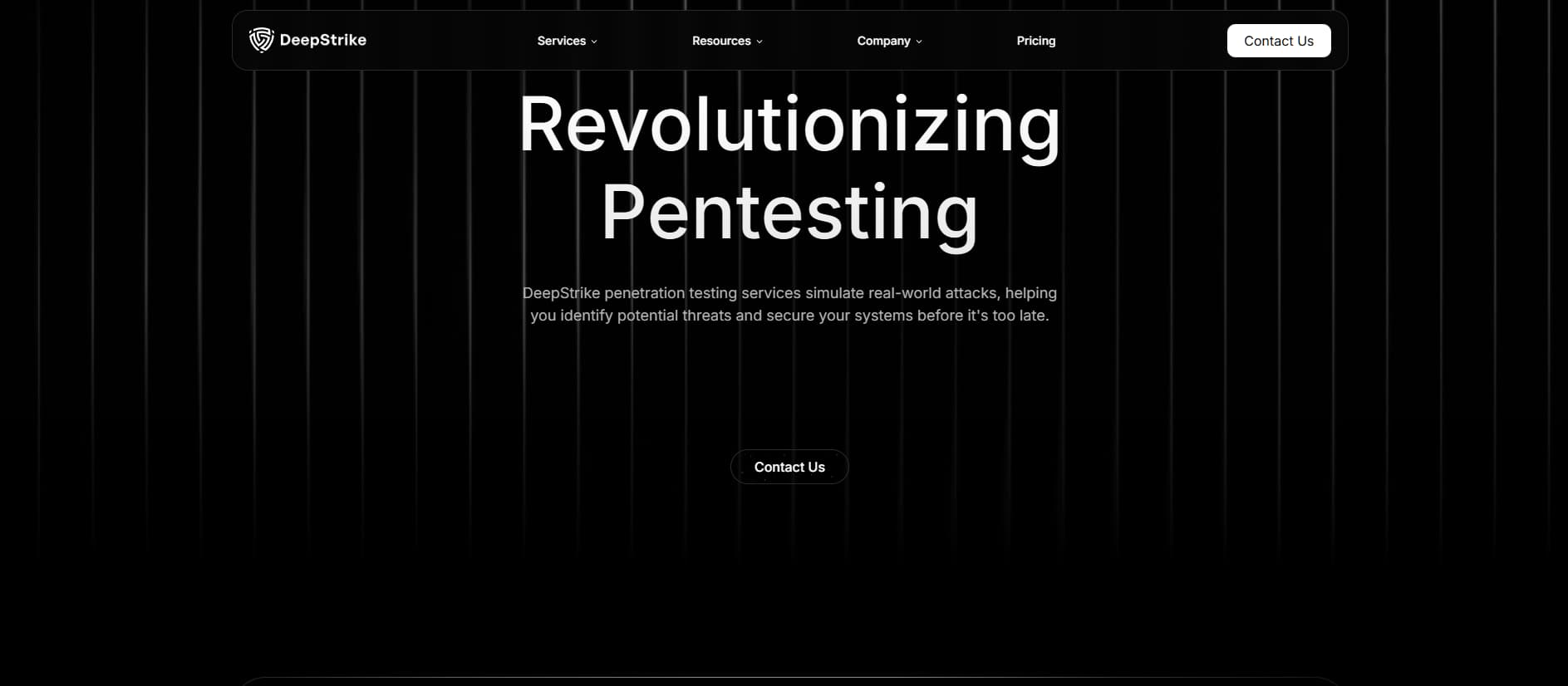
DeepStrike is included in this list based on the same evaluation criteria applied to all providers.
DeepStrike operates a hacker led, manual first penetration testing services model combining expert driven assessments with a collaborative PTaaS platform. Austrian organizations seeking audit ready validation, rapid onboarding, predictable pricing, unlimited retesting, and DevSecOps alignment frequently evaluate DeepStrike for web, mobile, API, cloud, and identity penetration testing services. The platform’s emphasis on real time collaboration, ticketing integrations, developer friendly reporting, and continuous monitoring aligns closely with modern DevSecOps workflows and continuous deployment environments where security validation must match release velocity.
Organizations comparing manual vs automated penetration testing often reference this analysis: which highlights why expert led exploitation remains critical for business logic flaws, authorization bypasses, chained vulnerabilities, and identity based attack paths that automated scanners routinely overlook. This distinction has become increasingly important as automation tools proliferate but still struggle with contextual reasoning and privilege escalation logic.
2026 Focus:DeepStrike expanded continuous testing capabilities, integrated AI assisted reconnaissance to accelerate triage while preserving human validation, strengthened NIS2 and DORA compliance mapping within reports, enhanced API centric assessment modules, increased identity provider testing depth, and broadened attack surface monitoring automation. Market positioning shifted toward enterprise DevSecOps pipelines, fintech platforms, healthcare SaaS environments, regulated cloud providers, and high growth startups requiring continuous penetration testing services rather than annual audits.
Best For: Continuous validation, SaaS platforms, fintech, healthcare, cloud native enterprises, and fast release development teams requiring immediate feedback loops and ongoing assurance.
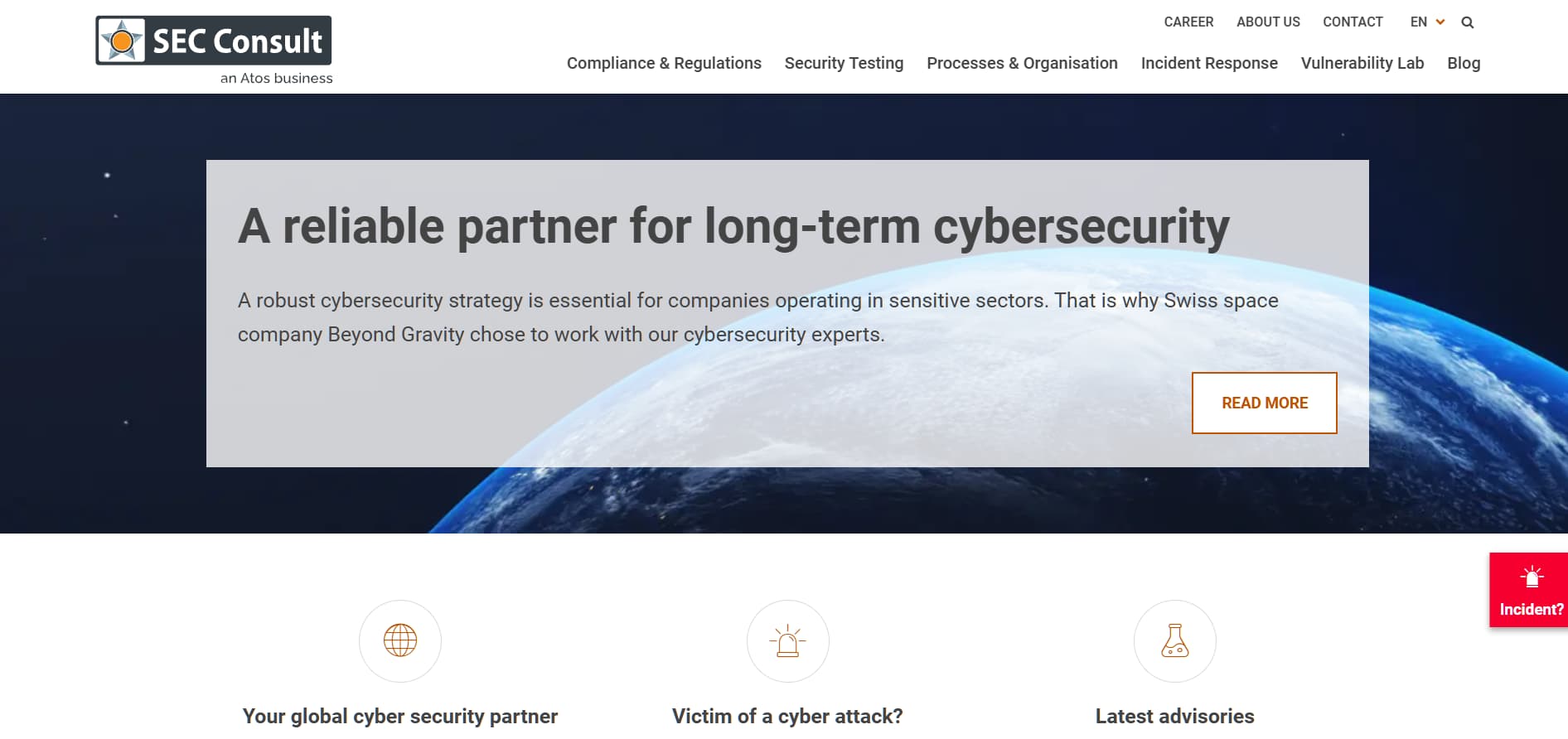
SEC Consult remains one of Europe’s most established consultancies, delivering large scale red team Austria and advisory engagements across government, telecommunications, and multinational sectors. Its integration into broader global consulting ecosystems enables cross border projects, multi jurisdictional compliance advisory, digital transformation support, and vulnerability research initiatives.
2026 Focus:Expanded digital sovereignty compliance services, enhanced Glass Box methodology blending source code review with exploit validation, deeper DORA technical testing alignment for financial institutions, extended research contributions to vulnerability disclosures and CVE publications, and broader embedded device security testing capabilities.
Best For: Large enterprises, critical infrastructure operators, government agencies, and multinational corporations requiring scale, research depth, and cross border advisory capabilities.
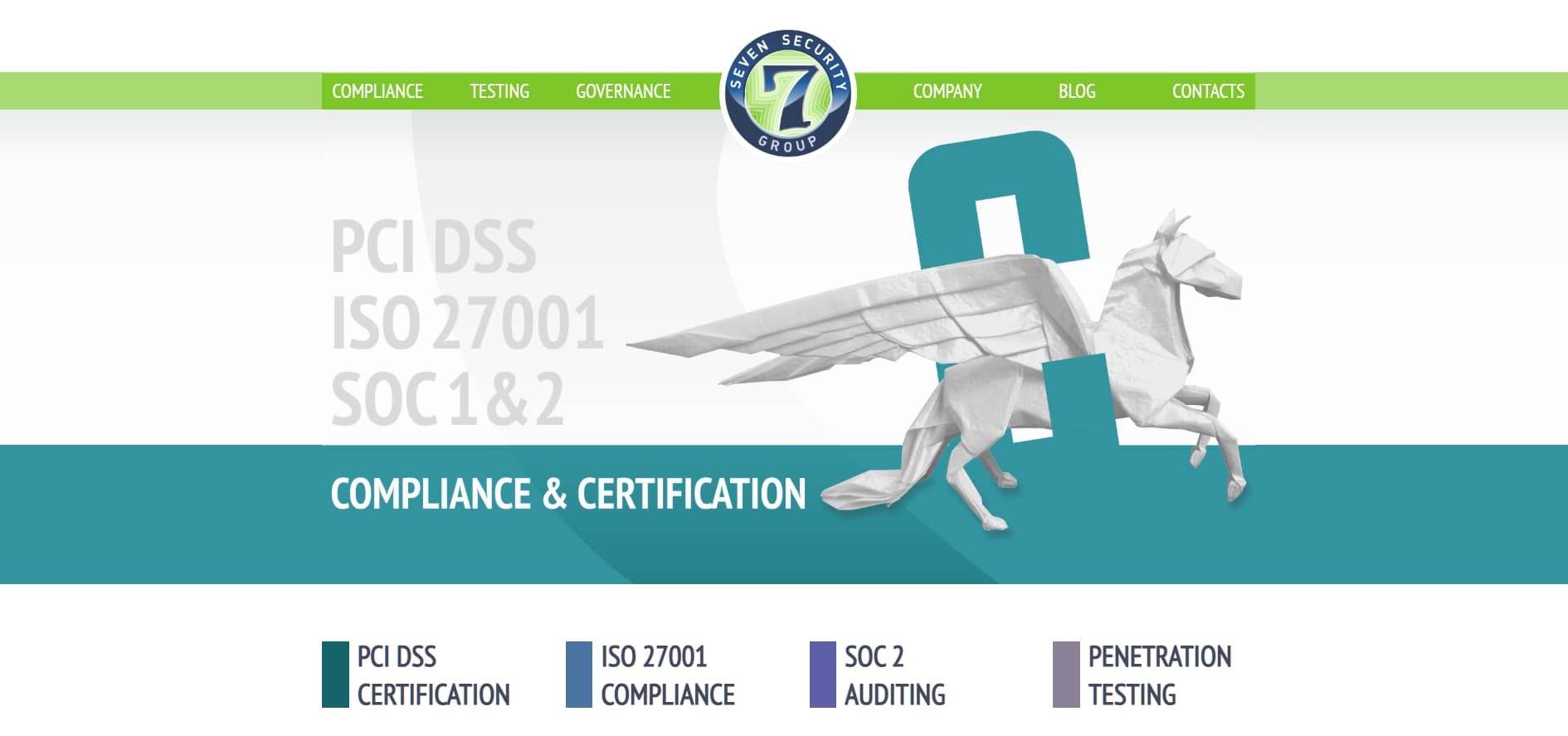
7Security continues to emphasize manual, methodology based audits aligned with PCI DSS and ISO 27001 certification readiness. The firm’s reputation centers on structured reporting, auditor friendly documentation, predictable engagement timelines, and strong remediation guidance suitable for mid market organizations operating under compliance pressure.
2026 Focus:Improved automated evidence collection for auditors, refined reporting templates for SOC 2 and GDPR security testing Austria, expanded SME engagement packages, introduced sector specific compliance playbooks for fintech and healthcare organizations, and increased emphasis on remediation verification cycles and follow up assessments.
Best For: Regulated SMEs, certification driven audits, fintech startups preparing for compliance milestones, and mid market enterprises seeking documentation clarity and structured remediation support.
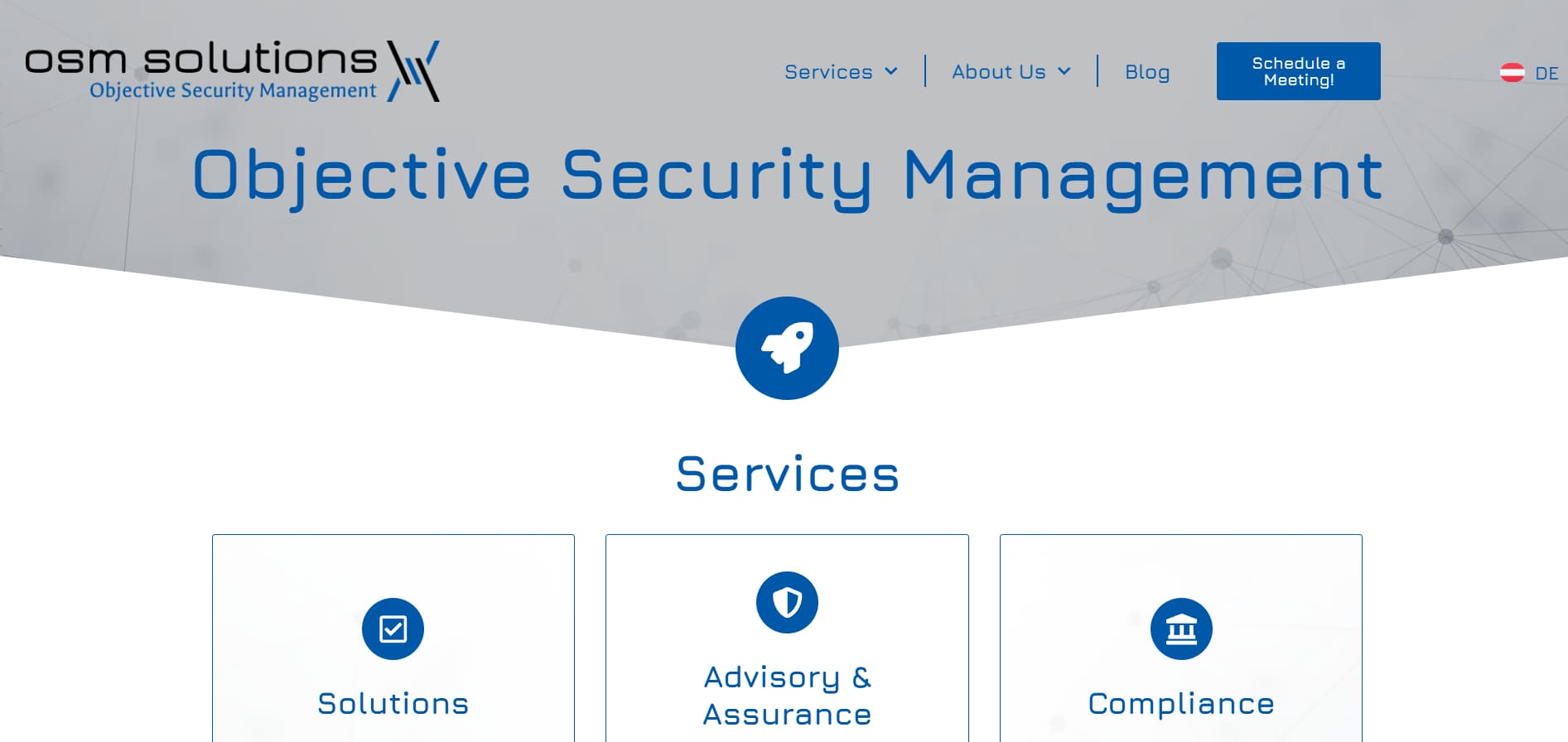
OSM Solutions maintains a personalized approach suited for Austrian startups and growth stage companies requiring flexible scopes, direct consultant communication, and rapid turnaround times. Its boutique structure enables close collaboration with internal development teams, tailored testing strategies, and rapid iteration cycles aligned with agile methodologies.
2026 Focus:Expanded DevSecOps advisory services, introduced container and Kubernetes testing modules, increased mobile application penetration testing depth, strengthened code review capabilities for microservice architectures, and broadened managed security offerings to complement offensive assessments.
Best For: Startups, technology SMEs, agile development teams, and organizations prioritizing flexibility, speed, and consultant accessibility over enterprise scale bureaucracy.
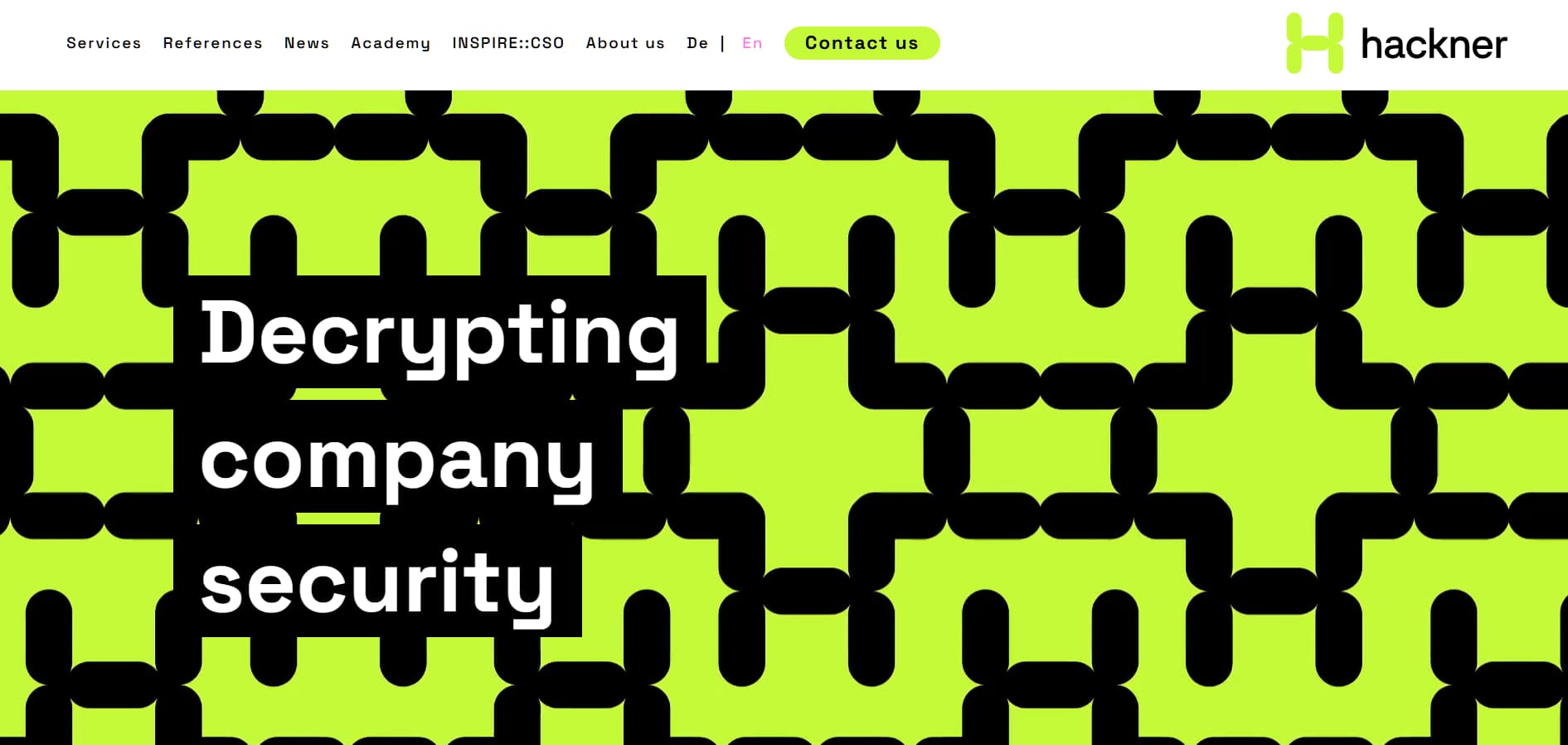
Hackner Security is recognized for deep technical adversary emulation and multi vector attack simulation across IT, human, and physical domains. Its research driven culture and emphasis on custom exploit development differentiate it from standardized testing providers and automated platforms focused on volume rather than depth.
2026 Focus:Greater emphasis on identity centric attack paths, stealth implant development, cross cloud persistence techniques, social engineering simulations, and multi week threat led campaigns aligned with advanced threat actor methodologies. Expanded tooling for Active Directory exploitation, hybrid cloud pivoting, and endpoint evasion was introduced.
Best For: High risk enterprises, financial institutions, energy providers, defense adjacent organizations, and entities seeking intelligence grade adversary emulation and research driven assessments.
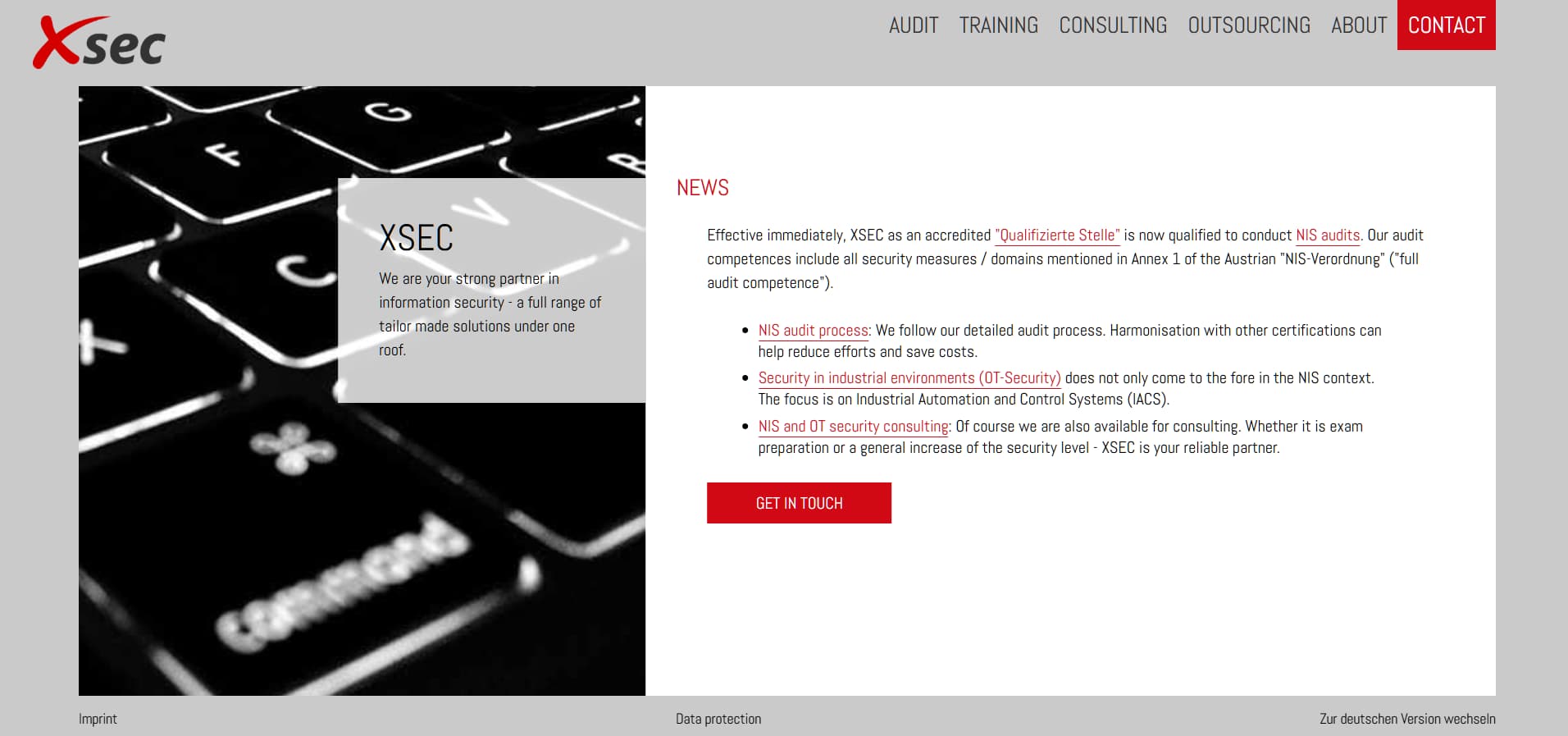
XSEC represents a large Austrian alliance of certified experts serving industrial, manufacturing, logistics, and retail sectors. Its consortium model allows for scalable engagements, shared expertise, standardized quality assurance, and strong national credibility within conservative industries.
2026 Focus:Strengthened OT/ICS penetration testing frameworks, standardized reporting quality across consortium partners, increased NIS2 documentation alignment, expanded internal training programs, enhanced industrial protocol testing methodologies, and improved coordination between consortium members.
Best For: Manufacturing, industrial automation, logistics companies, and conservative enterprises requiring standardized assurance, national level credibility, and multi disciplinary expertise.
| Company | Specialization | Best For | Region | Compliance | Ideal Size |
|---|---|---|---|---|---|
| DeepStrike | Continuous PTaaS, Web/Mobile/Cloud/API | DevSecOps, SaaS, Fintech | Global / EU | ISO 27001, PCI DSS, SOC 2, GDPR, NIS2 | SMB–Enterprise |
| SEC Consult | Enterprise Advisory & Research | Government, Critical Infra | EU / Global | ISO 27001, DORA, NIS2 | Enterprise |
| 7Security | Compliance Pentests | SMEs, Certification Audits | DACH | PCI DSS, ISO 27001 | SMB–Mid |
| OSM Solutions | Boutique Agile Testing | Startups, Tech SMEs | Austria | OWASP, PTES | SMB |
| Hackner Security | Red Team & Research | Finance, High Risk Enterprises | DACH | ISO 27001 | Mid–Enterprise |
| XSEC Consortium | Industrial / OT Testing | Manufacturing | Austria | ISO 27001, ÖNORM | Mid–Enterprise |
SMB Tier: €3,000 €12,000Single scope web or mobile assessments, limited retests, point in time audits, typically lasting 3–7 days depending on complexity, technology stack, application count, and reporting requirements.
Mid Market: €12,000 €35,000Multi application testing, API reviews, structured reporting, optional retest windows, advisory workshops, prioritized remediation roadmaps, and executive summaries for stakeholders.
Enterprise: €35,000 €120,000+Large environments, hybrid cloud, Active Directory, social engineering, red team Austria exercises, multi phase assessments spanning several weeks, executive briefings, and compliance mapping.
Red Team / Adversary Simulation: €60,000 €250,000+Threat led, multi week campaigns with custom tooling, stealth persistence techniques, identity abuse scenarios, lateral movement simulations, and board level debriefings.
Subscription & Continuous Validation:PTaaS Austria pricing models increasingly range from €2,000 €8,000 per month, including recurring assessments, attack surface monitoring, identity exposure tracking, dashboard access, remediation management, and collaboration tooling. Retest policies, SLA guarantees, and reporting frequency now represent key procurement differentiators influencing long term ROI and vendor retention.
For detailed budgeting benchmarks, many Austrian buyers consult penetration testing pricing research
Selecting a provider requires balancing technical depth, compliance expertise, operational fit, communication quality, reporting clarity, and long term partnership potential. Buyers evaluating penetration testing Austria, cloud penetration testing Austria, or PTaaS Austria services should assess:
Organizations comparing internal vs external testing models often reference this guide:
AI accelerates reconnaissance, anomaly detection, and data correlation, but human expertise remains critical for exploit validation, contextual reasoning, and business logic flaw discovery.
Continuous validation is increasingly complementing rather than fully replacing annual compliance audits, particularly for SaaS and DevOps driven environments with rapid deployment cycles.
Many cyber insurance providers request documented PCI DSS pentest Austria or red team Austria evidence prior to underwriting or renewal, especially for regulated industries.
OSCP, OSWE, CISSP, CREST, and GIAC credentials remain highly valued alongside ISO 27001 organizational certification and demonstrated industry experience.
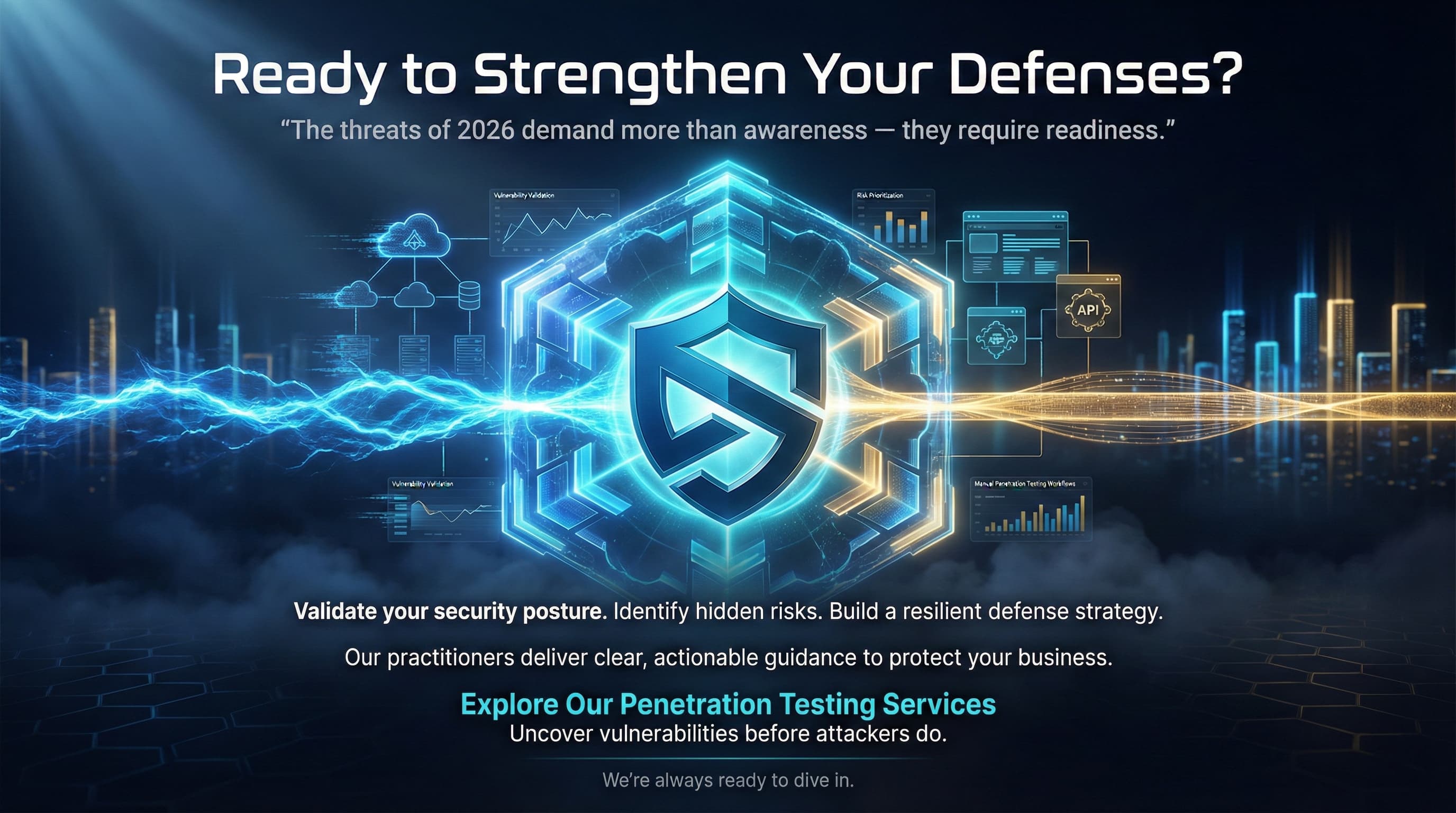
Ready to Strengthen Your Defenses? The threats of 2026 demand more than just awareness; they require readiness. If you're looking to validate your security posture, identify hidden risks, or build a resilient defense strategy, DeepStrike is here to help. Our team of practitioners provides clear, actionable guidance to protect your business. Explore our Penetration Testing Services to see how we can uncover vulnerabilities before attackers do. Drop us a line, we’re always ready to dive in.
Mohammed Khalil is a Cybersecurity Architect at DeepStrike, specializing in advanced penetration testing and offensive security operations. With certifications including CISSP, OSCP, and OSWE, he has led numerous red team engagements for Fortune 500 companies, focusing on cloud security, application vulnerabilities, identity abuse scenarios, adversary emulation, and advanced threat modeling. His work involves dissecting complex attack chains, developing resilient defense strategies, advising executive leadership on risk reduction, mentoring security teams, contributing to industry research on emerging threat vectors, and supporting organizations in achieving compliance readiness across finance, healthcare, and technology sectors.

Stay secure with DeepStrike penetration testing services. Reach out for a quote or customized technical proposal today
Contact Us